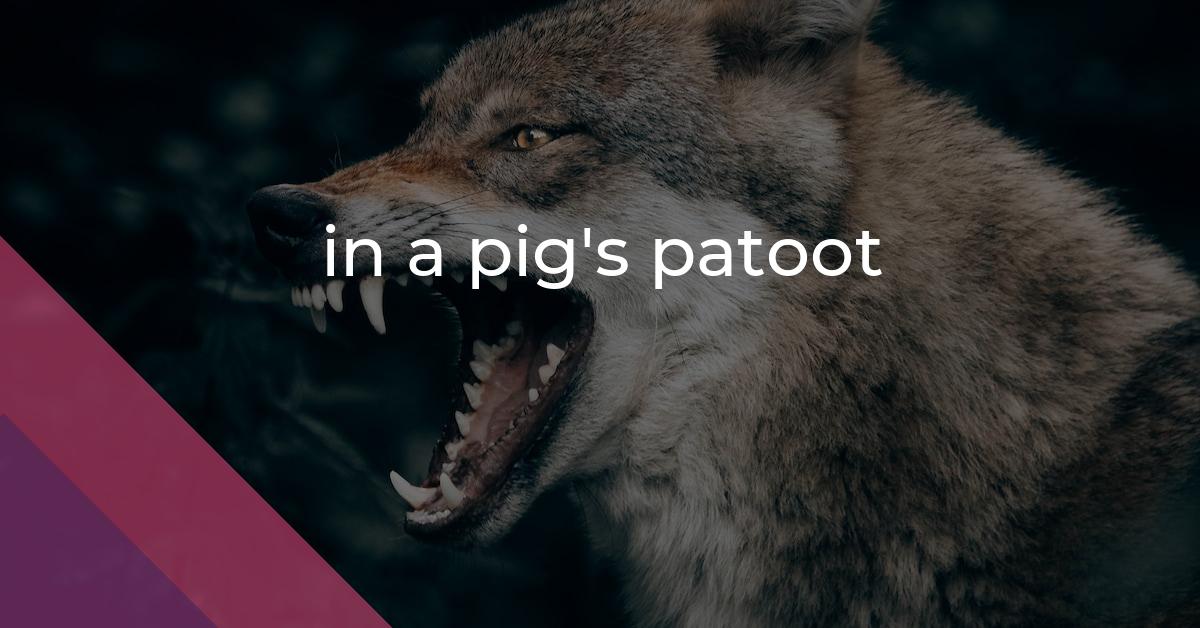in a pig’s patoot: Idiom Meaning and Origin
What does ‘in a pig's patoot’ mean?
The idiom "in a pig's patoot" means in a difficult or unpleasant situation. It is often used to express frustration or annoyance. The exact origin of this phrase is unclear, but it likely refers to the idea of being in an undesirable or uncomfortable position, similar to being in a pig's hindquarters.

Idiom Explorer
The idiom "ox is in the ditch" means to be in a difficult or problematic situation that requires immediate attention or assistance.
The idiom "in Dutch" means to be in trouble or in a difficult situation. It originated from the stereotype that the Dutch language is difficult to understand, so being "in Dutch" implies being in a perplexing or problematic state.
Meaning: When faced with a difficult situation or a shortage of resources, the phrase "in a pinch" means to manage or get by, even though it may not be the ideal solution.
The idiom "in a pig's eye" is used to express disbelief or skepticism towards something, suggesting that it is highly unlikely or impossible to be true.
"In a pig's arse" is an idiom used to express strong disbelief or denial. It indicates that something is highly unlikely or impossible to occur. The phrase draws on the image of an unimaginable or absurd situation, associating it with the rear end of a pig for emphasis.
The idiom "in a bind" means to be in a difficult or challenging situation where there are not many options or solutions available.
Idiom Analysis:
The idiom "in a bake" means to be in a difficult or challenging situation, like being caught in a sticky situation. It implies feeling trapped or overwhelmed by circumstances.
Revealing the Mystery
The idiom "in a pig's patoot" is a colloquial phrase originating in the United States. It is used to convey disbelief, skepticism, or doubt about the truthfulness or possibility of a statement or claim. The idiom is often employed in a sarcastic or humorous manner to express a high level of skepticism or incredulity.
One related idiom is "in a pig's arse," which is used in British English to convey a similar sense of disbelief or skepticism. While the exact phrase differs, both idioms carry a similar meaning and are used to express doubt or incredulity.
Similarly, the idiom "happy as a pig in shit" is used to describe extreme happiness or contentment. While the phrase "in a pig's patoot" is more focused on disbelief or skepticism, the use of animal-related imagery in both idioms highlights the subjective nature of emotions and the wide range of experiences portrayed through idiomatic expressions.
Another related idiom is "in a pig's eye," which is used to express doubt, skepticism, or disagreement. This phrase, like "in a pig's patoot," conveys a sense of incredulity or disbelief. The use of the word "eye" in this idiom adds another layer of figurative language and reinforces the notion of doubt or skepticism.
Additionally, the idiom "happy as a pig in mud" is used to describe someone who is extremely happy, content, or at ease. While this idiom highlights positive emotions rather than skepticism or doubt, it shares the common association of pigs with certain behaviors or states of being.
It is worth noting that the use of animal-related idioms, such as these, is a common linguistic phenomenon in various cultures around the world. Animal references are often employed to convey certain emotions, attitudes, or ideas in a succinct and memorable manner. In the case of "in a pig's patoot" and its related idioms, the use of pigs as a point of reference taps into shared cultural assumptions and associations.
Understanding idiomatic expressions such as these requires a familiarity with the cultural and linguistic context in which they are used. Although they may seem simplistic or trivial at first glance, idioms serve as powerful markers of social identity and shared experiences. They reflect the intricacies of a language and its users' creativity in finding novel ways to express their thoughts and emotions.
As with many idioms, "in a pig's patoot" and its related idioms invite further exploration and interpretation. They are a testament to the richness and complexity of language, and the countless possibilities for its evolution and adaptation. The humorous and metaphorical nature of these idioms ensures their continued relevance and potential for imaginative use in the ever-changing landscape of language.
Example usage
Examples of how the idiom "in a pig's patoot" can be used in a sentence:
- She thought she could teach him how to play chess, but he was clueless and lost the game in a pig's patoot.
- The new intern tried to fix the broken coffee machine, but only made it worse. Now it's leaking coffee in a pig's patoot.
- They attempted to organize a surprise party for their friend, but their plans fell apart in a pig's patoot when he accidentally found out.
More "Vulgarity" idioms



